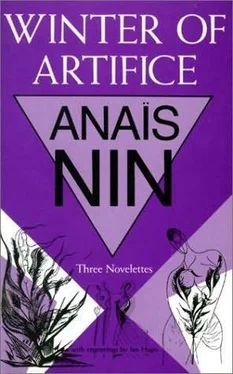Anaïs Nin - The Winter of Artifice
Здесь есть возможность читать онлайн «Anaïs Nin - The Winter of Artifice» весь текст электронной книги совершенно бесплатно (целиком полную версию без сокращений). В некоторых случаях можно слушать аудио, скачать через торрент в формате fb2 и присутствует краткое содержание. Год выпуска: 2007, Издательство: Sky Blue Press, Жанр: Классическая проза, на английском языке. Описание произведения, (предисловие) а так же отзывы посетителей доступны на портале библиотеки ЛибКат.
- Название:The Winter of Artifice
- Автор:
- Издательство:Sky Blue Press
- Жанр:
- Год:2007
- ISBN:нет данных
- Рейтинг книги:4 / 5. Голосов: 1
-
Избранное:Добавить в избранное
- Отзывы:
-
Ваша оценка:
- 80
- 1
- 2
- 3
- 4
- 5
The Winter of Artifice: краткое содержание, описание и аннотация
Предлагаем к чтению аннотацию, описание, краткое содержание или предисловие (зависит от того, что написал сам автор книги «The Winter of Artifice»). Если вы не нашли необходимую информацию о книге — напишите в комментариях, мы постараемся отыскать её.
“A handful of perfectly fold fables, and prose which is so daringly elaborate, so accurately timed… using words as magnificently colorful, evocative and imagist as any plastic combination on canvas but as mysteriously idiosyncratic as any abstract.”
—
The Winter of Artifice — читать онлайн бесплатно полную книгу (весь текст) целиком
Ниже представлен текст книги, разбитый по страницам. Система сохранения места последней прочитанной страницы, позволяет с удобством читать онлайн бесплатно книгу «The Winter of Artifice», без необходимости каждый раз заново искать на чём Вы остановились. Поставьте закладку, и сможете в любой момент перейти на страницу, на которой закончили чтение.
Интервал:
Закладка:
While he looked at his room he could not sleep. It seemed to him that the room was made to efface Mischa. Mischa’s moods, his differences, his disharmony with everyone. In the corner stood his ‘cello in its black sarcophagus.
He wanted to sleep. He wanted to sleep.
The room did become smaller and smaller, and darker, as if he were being placed in a real chestnut which closed around him. And as soon as it became smaller, he saw windows flung open and flames bursting from them. Behind the flames the faces of madmen shrieking and grimacing. The walls crumbled. The bars were twisted open. The madmen crawled out between them, then ran in all directions, with their hair standing on end. Some of them still wore their straight-jackets. They fell on their backs and could not pick themselves up. They lay there like scarabs and the crowd ran over them. Bells. Whistles. Dust raised. Stones rolling. Hands twisted trying to rend the air. When the people crashed into each other they looked at each other. They saw the same face. It was the face of a madman. The eyes protruded and the mouth hung lower on the right side. They touched each other. It was a mirror they were touching. Another mirror. Another mirror. A thousand faces all alike. They ran, they bowed, they kneeled, they fell on their faces, they wept, and all of them were doing exactly the same thing… They rushed into a house. A tall man was sitting in an armchair. He was looking down at his insides which were exposed. He was watching how the blood moved, how the liver functioned. Intestinal functioning, like the wheels, chains, canals, labyrinths of a factory. Microbes climbing through the arteries in military order. Food deteriorating. Canals like inside a coal mine; little wagons travelling up and down, carrying food. Bridges. Canals. Plants growing. Seeds falling. It was the Voice who was oiling the mechanism with an eye-dropper. The Voice who picked up a few drops and placed them in a bottle. He examined it with a microscope. Enlarged it showed the inside of an egg. Inside of this egg there were clouds, and resting on the clouds two eyes shedding tears, with their roots dangling behind. The tears fell into an oyster opening and closing. A woman slipped her tongue into the oyster.
The inside of the Voice was now like a printing press shaped like a liver, a heart, the entrails. Words fell into separate letters inside a small drawer. Words and letters were running through the intestines like the words in a printing press. The pages came out in neat piles. The Voice read them. The pages were dripping blood on the rugs. The Voice closed the little door of his insides and leaned over towipe the stains away. The mad crowd surrounded him. He pointed to the sky. The sky was the roof of his room. The stars and moon were made of cardboard and moved with strings like puppets. The Voice pressed a button. The motions of the planets were reproduced, but shakingly, hesitatingly, as if the machine were not working very well. The madmen looked on, bewildered. The Voice opened the little door to his brain. The brain like the skeins of tangled wool. The ribbon of a movie film, a travelogue picture passing very fast. Monuments, streets, churches, but appearing upside down. A little boy was buying a newspaper from another little boy in the street. In his room he spread the newspaper on the floor and made a paper boat and a bird. He wrote in big letters: “Dear Papa and Mamma, please return Pinocchio to the library or you will be fined for it.” He sat on the paper boat and immediately it sank. Then the paper boat floated up again, half open, lying on its side, floating down the river.
The Voice closed the little door to his brain. He turned the X-ray machine on the crowd. He turned it upon the women standing there. On the stomach of one of the women. One could see inside her womb a dead child. Inside another woman twins lying entangled. One twin is dead and the other is writhing, seeking to escape. Inside another woman there is a child asleep, covered with fur. Inside another woman lies a coiled snake, asleep.
A woman is following Mischa stealthily. He falls. She leans over with a heavy stick and beats his legs until they break. She leans over to look at them. They are the knotted roots of trees; mushrooms are growing all over them. The woman runs to the village to get a coffin. They try to place Mischa in the coffin, but he is too long for it. They begin to saw off his legs, and then the body is placed in the coffin. The woman picks up the legs. They stand alone like a pair of boots. The boots begin to sink into the sand.
The noise of strong suction was not the noise of the sand finally sucking his legs down, but the breakfast contraption being violently sucked closed again, and on the rug lay the tiny box he hated, with a breakfast arranged like a mathematical calculation. He looked at it from the receding shores of his dream. He wanted to return to the dream. There was nothing left of it. An island there, a deserted island where many things had happened. He could see it receding. The sand must still be in his clothes. His legs buried. He looked at them. They were asleep. But no scar left where they had been sawed off.
“I never noticed,” said Lilith to the Voice, “that the sun comes into this room. I always felt it was a dark room, because of all the secrets.”
“Maybe it’s in you there are no more secrets.”
“I don’t know. Your understanding saved me from confusion and pain. I feel dependent on you. You have the vision. I get lost. You teach, you are humanly tender and protective. Do you really think a woman can find her way all alone, completely alone?”
“Not if she’s a real woman.”
“I must have become a real woman right here, for I feel the dependence now, and I don’t mind it. I like it.”
Then Lilith stopped because she saw he did not like what she was saying.
“Do you know the meaning of your own name?” asked the Voice. “It’s the unmated woman, the woman who cannot truly be married to any man, the one whom man can never possess altogether. Lilith, you remember, was born before Eve and made out of red earth, not of human substance. She could seduce and ensorcell but she could not melt into man and become one with him. She was not made of the same human substance.”
“Do you think I am altogether like the first Lilith?” she asked without looking at him.
“I don’t know. The way you talk about dependence does not mean love. It means the love for the Father, who is the symbol of God. You are seeking a father… How exactly do you think of me?”
But before she could answer his question the little man left his analyst’s chair and walked up to her. Lilith heard his breathing and felt he did not want to hear the answer.
What she read in his eyes was the immense pleading of a man, a man imprisoned inside a seer, calling out for the life in her, and at the very moment when every cell inside her body closed to the desire of the man she saw a mirage before her as clearly as men saw it in the desert, and this mirage was a figure taller than other men, a type of saviour, the man nearest to God, whose human face she could no longer see except for the immense hunger in the eyes. And she felt a kind of awe, which she recognized. Every time she was faced with a sacrifice of the self, with the demand of another, a hunger, a prayer, a n, there came this joy. It was like the joy of a prisoner who finds the bars of his cell suddenly broken down. The mirage took the place of all actual physical sensation. It was if all the walls, all the limitations, all the personal desires were transcended. It was not an ecstasy of the body, but a sudden break with the body, a liberation and a stepping into a new region. With the abandon came this joy as of a transcendent flight upward, breaking the chains of awareness. Abandon brought a drunkenness, the fever of generosity, the joy of self-forgetting. A joyous victim, a victim of the imperfections of the universe which it was in her power, for the moment, to redress, to alter. In her power, for the moment, to make all the gifts promised so long ago in the fairy tales of childhood. What had prevented the fairy tales from materializing was the lack of faith and the lack of love.
Читать дальшеИнтервал:
Закладка:
Похожие книги на «The Winter of Artifice»
Представляем Вашему вниманию похожие книги на «The Winter of Artifice» списком для выбора. Мы отобрали схожую по названию и смыслу литературу в надежде предоставить читателям больше вариантов отыскать новые, интересные, ещё непрочитанные произведения.
Обсуждение, отзывы о книге «The Winter of Artifice» и просто собственные мнения читателей. Оставьте ваши комментарии, напишите, что Вы думаете о произведении, его смысле или главных героях. Укажите что конкретно понравилось, а что нет, и почему Вы так считаете.











